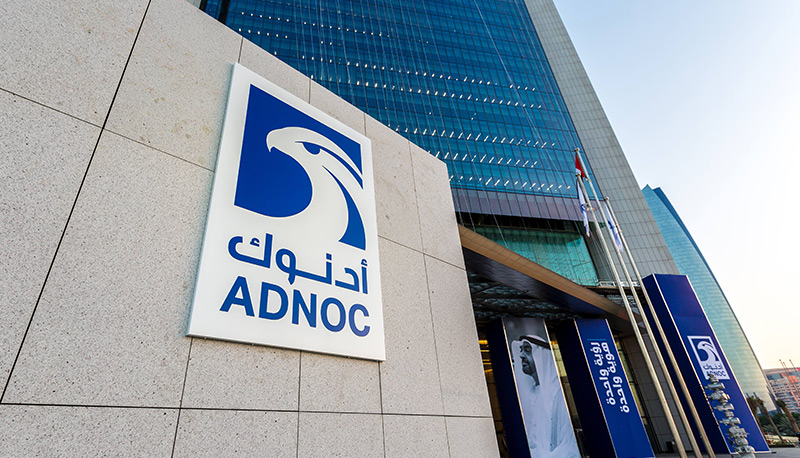Abu Dhabi National Oil Company (ADNOC), bp and Masdar announced the signing of strategic framework agreements to expand upon the UAE and UK’s longstanding track record of bilateral partnership in sustainability, including the potential development of clean hydrogen hubs in both the UK and UAE at a scale of at least 2 gigawatts (GW).
The agreements underscore the partners’ leadership in technology-driven solutions to the global climate challenge as well as a shared commitment to driving new economic opportunity through decarbonization, both domestically and abroad.
The signing of the framework agreements took place on the sidelines of His Highness Sheikh Mohammed bin Zayed Al Nahyan’s, Crown Prince of Abu Dhabi and Deputy Supreme Commander of the UAE Armed Forces, official visit to the UK. The agreements were signed by His Excellency Dr. Sultan Ahmed Al Jaber, UAE Minister of Industry and Advanced Technology, ADNOC Managing Director and Group CEO, and Masdar Chairman, and Bernard Looney, bp Chief Executive Officer.
Commenting on the agreements, H.E. Dr. Sultan Ahmed Al Jaber said: “The UK and UAE have enjoyed decades of strong economic ties and the agreements signed between ADNOC, Masdar and bp will serve to deepen the strategic relationship between our countries. We look forward to building upon this legacy to strengthen both countries’ ambitions to generate economic growth through low-carbon initiatives. These initiatives will make a direct contribution to the ‘Principles of the 50,’ the economic blueprint for sustainable growth recently announced by the UAE’s leadership.”
Bernard Looney, bp’s Chief Executive Officer, said: “The UK and UAE governments have bold plans for decarbonization. The UK is our home and we have worked in the UAE for nearly a century. By partnering with the visionary leaders of ADNOC and Masdar, we see massive business opportunity to generate the clean energy the world wants and needs – and at the same time revitalize local economies and create the jobs of the future.”
Under the terms of the agreements, ADNOC, bp and Masdar will seek to collaborate on UK and UAE clean hydrogen hub development at an initial scale of 1GW in the UAE and 1GW in the UK, building on the UAE’s position as an anchor investor in some of the UK’s largest offshore wind projects. The hydrogen agreements also align with the UK’s recently announced commitment to achieve 5GW of low-carbon hydrogen by 2030 and the UAE’s Nationally Determined Contribution of reducing greenhouse gas emissions by 23.5% compared to business as usual for the year 2030.
ADNOC and bp will also, as part of the agreements, jointly identify areas for potential partnership in greenfield carbon capture and underground storage and best-in-class methane detection platforms. Further, Masdar and bp will together explore opportunities to develop, build and operate sustainable energy and mobility solutions in urban population centers.
The partners’ shared interest in developing new opportunities for clean hydrogen development capitalizes on the UK and UAE’s highly complementary infrastructure and resource positions. With abundant renewable energy sources and proximity to significant future demand centers for hydrogen and its carrier fuels, the partners’ commitments can help to ensure the UK and UAE are well positioned to become regional leaders in the new hydrogen economy and support both countries’ ambitious climate targets.
CCUS, an equally critical component of the world’s decarbonization toolkit, has been built successfully at commercial scale in the UK and UAE through the Teesside and Al Reyadah facilities, respectively. With the framework agreement, the two partners look forward to expanding their shared leadership in CCUS technology to explore pilot opportunities for further industrial-scale carbon capture within the UAE.
While the UAE has long maintained a zero-routine flaring policy, the partners’ potential collaboration on new methane detection technologies will help to further maximize the impact of both countries’ decarbonization strategies. Methane, at more than eighty times the potency of CO2, remains at the top of GHG mitigation agendas, necessitating the partners’ shared pursuit of cutting-edge monitoring and analysis platforms.
Similarly, ADNOC and bp’s joint smart decision center initiative will support possible development and deployment of remote digital capabilities to transform both companies’ performance management and operational support, including in the area of energy efficiency.
Masdar and bp will also explore potential opportunities to together develop, build and operate energy and mobility services in urban spaces internationally, including energy efficiency, distributed renewables generation and energy storage, among others.
The initiatives envisaged by the strategic framework agreements would be subject to relevant regulatory approvals.







